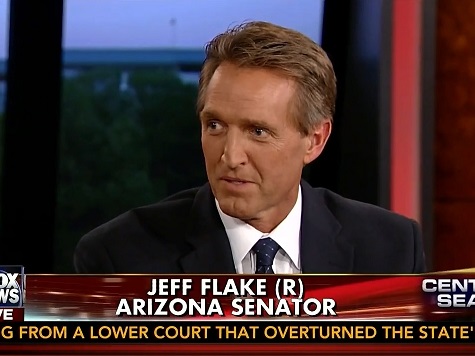In an appearance on Fox News Channel’s “Special Report” on Wednesday, Sen. Jeff Flake (R-AZ) discussed the current state of affairs surrounding the issue of immigration.
Flake, the guest of the show’s occasionally occurring “Center Seat” segment, admitted the rise of a populist movement opposing any immigration reform movement that included a version of amnesty. However, he admitted to being perplexed as to why there’s such an opposition stating there’s a need for not only low-skill labor “particularly in the agricultural areas and hospitality areas,” but high-skill labor of “those in the STEM fields.”
Partial transcript as follows:
STEPHEN HAYES, Weekly Standard: You indicated that you’re still for comprehensive immigration reform but that nothing can happen in this environment. What do you mean by “in this environment”?
FLAKE: As long as we have crisis like this with kids coming across, you’ve got to deal with this immediate crisis.
HAYES: Immigration reform wasn’t’ going to pass before this sort of blew up or before it was on the front pages, was it? Go back three months.
FLAKE: Three months ago we did have a chance. I think the Cantor loss really was the death knell for it. Up until that time I thought we still had a shot at it. But with this crisis, no chance, obviously.
BRET BAIER, host “Special Report”: Jason?
JASON RILEY, Wall Street Journal: I want to ask you about the shifting emphasis of this debate in recent years. I know you have been covering this a long time, even back in the House you followed this quite closely. Back then, to me, on the right you heard a lot of law and order talk. And this is a sovereign nation. We should be able to solve our border. You still have that today. But it’s almost being overwhelmed by a more populist, protectionist argument, legal, illegal, high school, there are too many unemployed people in America to be admitting any immigrants under any circumstances. What do you make of that sort of shift in emphasis? Is this a result of the recession or is this a more fundamental shift in Republican view of immigration?
FLAKE: That’s a very astute point. I do agree with you. I can’t explain it. I don’t agree with it. But nonetheless, I think that that is true. You are seeing more of that. Put aside the low-skilled side, and I would argue you are going to have need for that as well, particularly in the agricultural areas and hospitality areas. But on the high skill side, my goodness, to not understand that we need more high skilled immigrants, those in the STEM fields, I just don’t understand.
RILEY: Just to follow up on President Obama’s sort of indifference, almost, it seems, to what is going on down there. Do you think his calculation is that the status quo hurts the Republicans more than it hurts me? I’m going to catch some flak from my left, but I’m in no danger of losing the Hispanic vote? They will either stay home, they’re not going to vote for me, or they are not going to go vote for Republicans. So I will just wait them out. They have more to lose than I do on this issue?
FLAKE: I don’t know. I don’t know what political calculation goes into it. I give him the benefit of the doubt we have just all been caught flat footed by this and we just need all to respond.
MARA LIASSON, National Public Radio: Speaker Boehner even today said once again we have to get back to immigration reform. This was just a couple weeks after he told the president it can’t happen this year. What do you think it will take for the Republican House to take this up and pass something? Not necessarily your bill, but something?
FLAKE: Given the legislative day, this is a small caliber left.
LIASSON: I’m not talking about this year. Do you think it can happen in 2015?
FLAKE: I do. I do, certainly substantively. I think many of us who pushed it to make that case politically. I’m among those who think that if Republicans want a shot at national office we have got to deal with this in a responsible way, not just to appeal to the Hispanic vote or any other groups, but I think Americans expect that a party governing ought to be rational, reasonable, and responsible. And I don’t think we have that.
BAIER: The critics say that in this particular situation that it would have been even more of a magnet had this law been in place, this bill become law. And that it’s not border security, that the border is secure, this is what critics say, but it is about how to deal with the people who are here.
FLAKE: I don’t agree at all. I think, one, there was significant resources for that border side. But if you create a legal framework for people to come and work here and return home, then you’ve dealt with a big portion of the problem. So I think that when you deal with the border security, you have a mechanism to deal with those who are here illegally that doesn’t constitute amnesty but does deal with that responsibly, and then you have temporary worker programs moving ahead, I think that is a recipe for actually solving the problem, not making it bigger.
Follow Jeff Poor on Twitter @jeff_poor

COMMENTS
Please let us know if you're having issues with commenting.